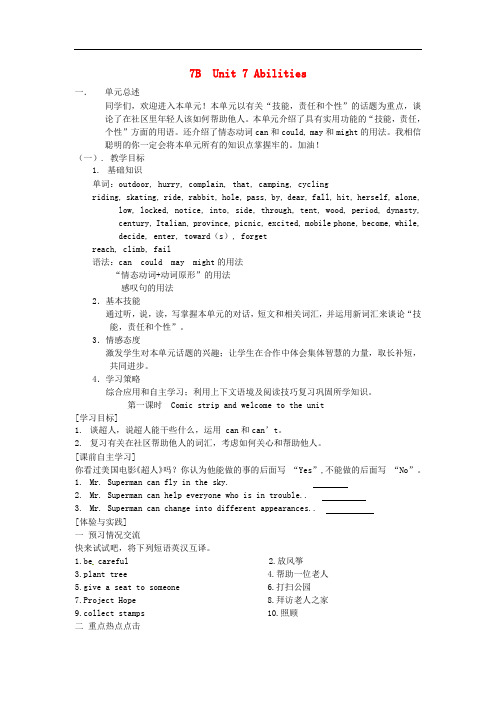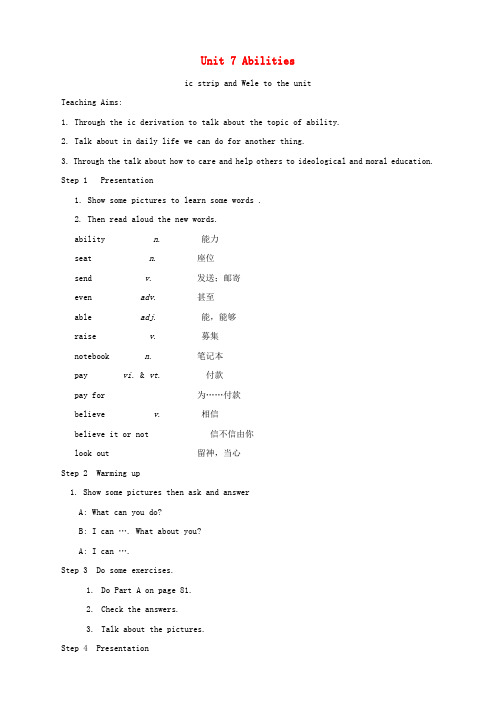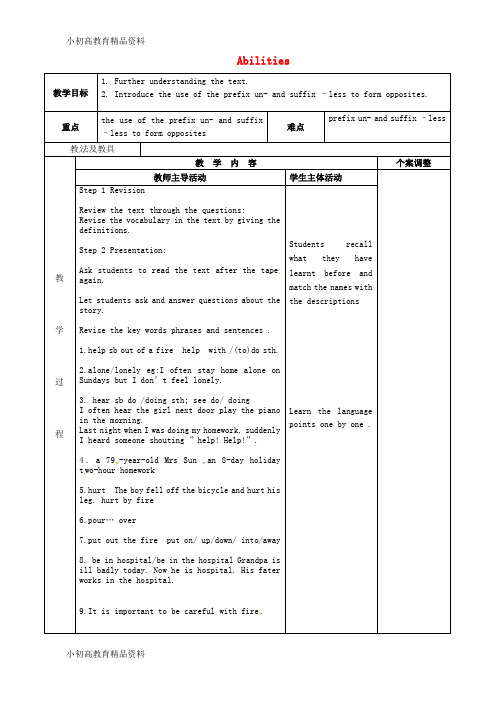七年级英语下册Unit7AbilitiesReading导学案(新版)牛津版
- 格式:doc
- 大小:42.50 KB
- 文档页数:5

7B Unit 7 Abilities一.单元总述同学们,欢迎进入本单元!本单元以有关“技能,责任和个性”的话题为重点,谈论了在社区里年轻人该如何帮助他人。
本单元介绍了具有实用功能的“技能,责任,个性”方面的用语。
还介绍了情态动词can和could, may和might的用法。
我相信聪明的你一定会将本单元所有的知识点掌握牢的。
加油!(一). 教学目标1.基础知识单词:outdoor, hurry, complain, that, camping, cyclingriding, skating, ride, rabbit, hole, pass, by, dear, fall, hit, herself, alone, low, locked, notice, into, side, through, tent, wood, period, dynasty,century, Italian, province, picnic, excited, mobile phone, become, while,decide, enter, toward(s), forgetreach, climb, fail语法:can could may might的用法“情态动词+动词原形”的用法感叹句的用法2.基本技能通过听,说,读,写掌握本单元的对话,短文和相关词汇,并运用新词汇来谈论“技能,责任和个性”。
3.情感态度激发学生对本单元话题的兴趣;让学生在合作中体会集体智慧的力量,取长补短,共同进步。
4.学习策略综合应用和自主学习;利用上下文语境及阅读技巧复习巩固所学知识。
第一课时 Comic strip and welcome to the unit[学习目标]1.谈超人,说超人能干些什么,运用 can和can’t。
2.复习有关在社区帮助他人的词汇,考虑如何关心和帮助他人。
[课前自主学习]你看过美国电影《超人》吗?你认为他能做的事的后面写“Yes”,不能做的后面写“No”。

Unit 7 Abilitiesic strip and Wele to the unitTeaching Aims:1. Through the ic derivation to talk about the topic of ability.2. Talk about in daily life we can do for another thing.3. Through the talk about how to care and help others to ideological and moral education. Step 1 Presentation1. Show some pictures to learn some words .2. Then read aloud the new words.ability n. 能力seat n. 座位send v. 发送;邮寄even adv. 甚至able adj. 能,能够raise v. 募集notebook n. 笔记本pay vi. & vt.付款pay for 为……付款believe v. 相信believe it or not 信不信由你look out 留神,当心Step 2 Warming up1. Show some pictures then ask and answerA: What can you do?B: I can …. What about you?A: I can ….Step 3 Do some exercises.1.Do Part A on page 81.2.Check the answers.3.Talk about the pictures.Step 4 PresentationShow some pictures present ic strip.Step 5 Listen and answer1. Can Eddie fly?2. Read the dialogue in pairs.3. Act it out.Step 6 Listening1. Listen to part B and answer the following question.1) What can they do for the children in poor areas?2) Can they raise some money for them?2. Read after the recorder.3. Pratice in pairs.4. Act it out.5. Make their own dialogue.Step 7 Explanation1. How cool! 多酷呀!这是一个感叹句。

牛津译林版英语七下Unit 7《Abilities》(Reading II)教学设计一. 教材分析牛津译林版英语七下Unit 7《Abilities》(Reading II)主要讲述了一位名叫Mrs. Clancy的老妇人在一次购物过程中丢失了她的钱包,然后发生了一系列寻找钱包的故事。
这篇文章主要锻炼学生对细节的理解能力,同时提高学生的阅读技能和词汇运用能力。
二. 学情分析七年级的学生已经具备了一定的英语基础,能够理解和运用一些基本的英语词汇和句型。
但是,他们在阅读理解方面还存在一定的问题,如对文章细节的理解不够深入,对文章结构的把握不够清晰等。
因此,在教学过程中,需要针对这些情况对学生进行有针对性的指导。
三. 教学目标1.知识目标:学生能够掌握文章中的关键词汇和句型,理解文章的主旨和细节。
2.能力目标:学生能够运用所学词汇和句型进行阅读理解和口语表达。
3.情感目标:学生能够培养对阅读的兴趣,提高自主学习的能力。
四. 教学重难点1.重点:学生能够理解文章的主旨和细节,掌握文章中的关键词汇和句型。
2.难点:学生能够运用所学词汇和句型进行阅读理解和口语表达。
五. 教学方法1.任务型教学法:通过设计各种任务,让学生在完成任务的过程中理解和运用所学知识。
2.情境教学法:通过创设情境,让学生在实际情境中运用所学知识。
3.小组合作学习:通过小组讨论和合作,提高学生的自主学习和合作能力。
六. 教学准备1.教师准备:教师需要熟悉教材内容,明确教学目标和重难点。
2.学生准备:学生需要预习教材内容,了解文章的基本情节。
七. 教学过程1.导入(5分钟)教师通过提问方式引导学生回顾上一节课的内容,激发学生的学习兴趣。
2.呈现(10分钟)教师通过展示文章标题和图片,引导学生预测文章内容。
然后,教师逐段呈现文章,让学生听读并回答相关问题。
3.操练(15分钟)教师设计各种任务,如填空、连线、判断等,让学生在完成任务的过程中理解和运用所学知识。

Period 1 Comic strip & Welcome to the unitClass____________ Name__________【Learning aims】To grasp the new words and phrases; To know different things in Helping Hands Club; Can say the ways to help the poor.【Learning important point】Know some abilities to help others.【Learning activities】Notes Activity 1在书中找出并背诵以下短语或者句子:1. 信不信由你2. 当心3. 给某人让位4. 为希望工程募集东西5. 清扫公园6. 拜访敬老院7. 最需要衣物与鞋子8. 为他们募集一些钱9. 一些家庭甚至不能负担起钢笔、簿本的费用。
Activity 2 Talk about different abilitiesStep 1: Show some pictures and say what they can do.Step 2: Make a dialogue.A: What is/are …doing? B: … is/are …A: What can …do? B: … can …Activity 3 Come to Eddie and Hobo’s worldStep 1: Show some pictures about a bird and a superman and to say their abilities.Step2. Listen and answer.(1) What does Eddie think of himself?(2) Can he fly ?Step3. Act out the dialogueActivity4 Go to Helping Hands ClubStep1 Know about Lei Feng and tell us what you think of him.Step2 Show some pictures and say what they can do in the Club.help an old man plant trees give a seat to someone clean up the parkStep3 Talk about your own and your classmates’ abilities(1)What abilities do you have?(2)What abilities do your classmates have?Step4 Talk about what they can do for the children in poor areas.(1)Listen and answer. What can they do to help the poor children?(2) Look at pictures and talk about how to help the people.She can’t finish her homework. He is ill in hospital.Period 2 Reading (I )Class____________ Name__________【Learning aims】To grasp the new words and phrases; To understand the passage ; Can say something about Li Tao in your own words.【Learning important point】Can understand the passage very well.【Learning activities】Activity 1在书中找出并背诵以下短语或者句子:1. 足够勇敢2. 从火中救了他的邻居3. 单独在家4. 听到某人正在大叫5. 她的左腿严重受伤6. 冲进厨房7. 把水泼在他的衣服上保护他自己8. 扑灭火9. 住院两周10. 没有时间考虑--- 11. 当心----Activity 2 Learn about fireStep 1 Look at the pictures and talk about fire.Fire is useful, but sometimes it is dangerous. If you are not careful with it, it can burn things oreven hurt you. A big fire can even burn forests and tall buildings. So keep yourself away fromfire.Step2 Talk about what we should do when there is a fire.call 119 for help run out of fire pour water around the house put a wet blanket over the bodyActivity 3 Know about a brave young manStep1. Listen and answerWhat did the young man do?Step2. Read and finish the following tableWhere What happenedIn abuildingHe was athomeLinTaohear heard someonesee saw a lot ofdo his neighbor a firefeel was notMrsSuncould not because she her legStep3 R ead and choose “T&F”(1) Lin Tao helped his neighbour out of a fire. ( )(2) Mrs Sun couldn’t get out because she hurt her left leg. ( )(3) Mrs Sun was in her kitchen when the fire took place. ( )NotesPeriod 3 Reading (II )Class____________ Name__________Period 4 GrammarClass____________ Name__________【Learning aims】To grasp the new words and phrases; To know and use “can\ could\ may”; Can Use “What & How” to express strong feelings.【Learning important point】To know and use “can\ could\ may”; Can use “What----!& How---!”【Learning activities】Notes Activity 1在书中找出并背诵以下短语或者句子:1. Millie能够说好英语。


牛津译林版七年级下册Unit 7《Abilities》(Reading I)教学设计一. 教材分析《Abilities》是牛津译林版七年级下册Unit 7的一篇阅读文章,主要讲述了一个关于作者在学校学骑自行车的经历,以及从中得到的启示:尝试新事物时可能会遇到困难,但只要努力,一定能够成功。
文章语言简单,情节生动,贴近学生的生活,有助于激发学生的学习兴趣。
二. 学情分析七年级的学生已经掌握了基本的英语语法和词汇,具备一定的阅读理解能力。
但他们在阅读过程中可能会遇到一些生词和短语,需要教师的引导和帮助。
此外,学生对自行车骑行的经历可能较为熟悉,可以借助这一点激发他们的学习兴趣。
三. 教学目标1.知识目标:让学生掌握文章中的关键词汇和短语,如“try somethingnew”、“have difficulty doing sth”、“give up”等。
2.能力目标:培养学生具备一定的阅读理解能力,能够概括文章大意,理解文章主题。
3.情感目标:引导学生从文章中汲取启示,勇于尝试新事物,培养坚持不懈的精神。
四. 教学重难点1.重点:文章中的关键词汇和短语。
2.难点:理解文章主题,从中得到启示。
五. 教学方法1.任务型教学法:通过设定各种任务,让学生在实践中学习和运用英语。
2.情境教学法:创设情境,让学生在真实的环境中感受和理解英语。
3.启发式教学法:引导学生主动思考,发现问题,解决问题。
六. 教学准备1.教师准备:备好相关课件、教学素材和拓展资料。
2.学生准备:预习课文,查阅生词。
七. 教学过程1.导入(5分钟)利用图片或实物展示自行车骑行场景,引导学生谈论自己的骑行经历,激发学生兴趣。
2.呈现(10分钟)展示文章标题和作者,让学生猜测文章内容。
然后逐段呈现文章,让学生边阅读边找出关键词汇和短语。
3.操练(10分钟)分组让学生用所学的关键词汇和短语描述自己尝试新事物的经历,鼓励学生用英语进行交流。
4.巩固(10分钟)针对文章内容设计一些问题,如:“Why did the author have difficulty riding a bicycle?”、“What did the author learn from trying agn and agn?”等,让学生回答,以检验学生对文章内容的理解。
牛津译林版七年级下册Unit 7《Abilities》(reading1)教学设计一. 教材分析牛津译林版七年级下册Unit 7《Abilities》(reading1)主要讲述了一个关于如何找到失踪老人的故事。
故事中,学生们通过观察、分析、推理等方法找到了失踪老人,展现了学生的观察能力和解决问题的能力。
本节课的主要内容是让学生掌握故事中的关键情节,提高学生的阅读理解能力,并引导学生运用所学知识解决实际问题。
二. 学情分析七年级的学生已经具备了一定的英语基础,对于阅读理解也有一定的掌握。
但部分学生对于如何抓住文章的主旨和细节信息还有一定的困难,同时,学生的阅读速度和阅读理解能力也有待提高。
在解决问题的能力方面,学生往往缺乏条理性和逻辑性。
因此,在教学过程中,需要关注学生的这些特点,有针对性地进行教学设计。
三. 教学目标1.知识目标:–能正确朗读和理解文章;–能掌握文章中的关键词汇和短语;–能理解文章的主旨和细节信息。
2.能力目标:–提高学生的阅读理解能力;–培养学生运用所学知识解决问题的能力;–提高学生的观察能力和逻辑思维能力。
3.情感目标:–培养学生热爱生活,关爱他人的品质;–培养学生团队合作,积极进取的精神。
四. 教学重难点•掌握文章中的关键词汇和短语;•理解文章的主旨和细节信息;•提高阅读理解能力。
•运用所学知识解决实际问题;•培养学生的观察能力和逻辑思维能力。
五. 教学方法1.任务型教学法:通过设定各种任务,引导学生主动参与课堂,提高学生的实践能力;2.情境教学法:创设各种情境,让学生在真实的环境中学习,提高学生的学习兴趣;3.合作学习法:引导学生进行小组合作,培养学生的团队合作精神。
六. 教学准备1.教师准备:熟悉教材内容,了解学生学情,设计教学活动和任务;2.学生准备:预习教材内容,了解基本词汇和短语。
七. 教学过程1.导入(5分钟)教师通过创设情境,如讲述一个失踪案件,引起学生兴趣,引导学生进入本节课的主题。
牛津译林版七年级下册Unit 7《Abilities》(Reading II)教学设计一. 教材分析《牛津译林版七年级下册Unit 7 Abilities》的Reading II部分主要讲述了一个关于班级同学参加学校运动会并取得优异成绩的故事。
通过这个故事,学生可以学习到关于运动会的相关词汇和表达方式,同时也能够了解到同学们在运动会上的努力和收获。
此外,本节课还涉及到了一些情态动词的用法,如can, may, must等,以及一些基本的语法结构,如一般过去时态。
二. 学情分析七年级的学生已经具备了一定的英语基础,能够听懂并运用一些基本的英语词汇和句型。
但是,对于一些情态动词的用法和一般过去时态的掌握还不够熟练。
因此,在教学过程中,教师需要针对学生的实际情况进行讲解和引导,让学生能够更好地理解和运用这些知识点。
三. 教学目标1.能够理解Reading II的故事内容,把握主要人物、情节和事件。
2.能够运用情态动词can, may, must等以及一般过去时态进行简单的句子表达。
3.能够通过阅读提高自己的语感和阅读能力。
四. 教学重难点1.情态动词can, may, must的用法。
2.一般过去时态的构成和用法。
3.如何正确运用所学的词汇和句型进行表达。
五. 教学方法1.情境教学法:通过设置运动会的情境,让学生在实际语境中学习并运用所学的词汇和句型。
2.任务型教学法:通过完成各种任务,如回答问题、小组讨论等,激发学生的学习兴趣,提高他们的参与度。
3.引导式教学法:教师引导学生进行思考和表达,帮助学生建立正确的语言习惯。
六. 教学准备1.PPT课件:制作与课程内容相关的PPT课件,包括故事内容、词汇、语法结构等。
2.教学卡片:准备一些与课程内容相关的词汇和句型的教学卡片,用于课堂上的操练和巩固。
3.作业布置:提前为学生准备一些与课程内容相关的作业,以便在课堂上进行巩固和拓展。
七. 教学过程1.导入(5分钟)利用PPT课件展示一些关于运动会的图片,引导学生谈论自己对运动会的看法和经历,激发学生的学习兴趣。
七年级英语下Unit 7 Abilities Reading 教案(新版牛津版)U集备部分课题7B Unit 7 Reading中心发言人时间Teaching aims:1.To introduce and expand vocabulary to describe dangerous situa2.To guxxle anduTgeneral meaningure and aTxt for overall meaning and scan for detail. Languagand focus:Award for Bravery/help sb. out of a fire/be alone/hear sb. shouting/a 79-year-old man/pour water over/put ou/bal/help ea/be careful wFire can be dangerous./ Iant to be careful wTeaching proceduWarming up: Talk about danger aAsk if any students have ever had an accident aTalk about what to do in case of dang2. Look aures andw words:ghbush, dangerous, burn, hurt, pour, rush, save, blanket, put ouReadandgaThen say T or F accordingx). Wang Fang helped her classmate out of a2). Wang Fang’s neighbouars old.3)un couldn’t get out becauurt her a). Wang Fang was afraid waw a l). Wang Fang put ouwith a blanket and helped Mrs. Sun ou). Tburned Wang Fang’s neck and leg.7). Wang Fang waal for tw). Wang Fang said she was glad to heland fire was not dangerouListen and read axt and ask qu). How oldbrave girl?2). When did she helghbour out of a fire?3). How oldun?4). Where waun wwas a fire?5). Why couldn’un get ouuse?6). How did Wang Fang put ou?7). Did Wang Fang hulf?8). How long was Wang Fangal?Discuss any problems abouxt.First fillblanks and readversaThen have an interview in grouWang FangaDiscuss in grouWhat dwWang Fang? What do you think about her? Why do you? What do you do when youaccident l?Visit Wang Fangal First read the task to understandRead the dialogud out andaReadversaaAct it ouAn interview Dgroups. In each grouudent can be Wang Fanganbview her. TgrouFire saReadand maght pictuRead ouAsk studways abouag: Don’t ruaDon’t plaad.Don’t lean out the window。
7B Unit 7 Abilities Reading教案Step 1:Words:1.Learn some new words after the pictures.2.Read the new words together.3.T: Daniel is reading a newspaper article about fire, but there are some difficult words. Let’s learn the words with him. Match the words on the left with the meaning on the right.Step 2 Lead-in:1.T: Fire is very important for us in our fire. What can we use it for?S: We can use it to make water hot, keep us warm, give us light and cook food.2.T: Fire is useful, but it can also be very dangerous if you’re not careful with it. It can burn things or hurt people. A big fire can even burn forests and tall buildings, so keep yourself away from fire.If there is a fire, what should we do?S:1.You should call 119.2.Rush out of the fire as quickly as you can.3.Shout for help.4.Pour water over the door.5.Put a wet blanket over the body.Step 3 Pre-reading:T: Wha t happened to the little boy?S: He is ill./ He hurt himself.T: Can you imagine who, what ,where, why about the story?S: who The 79-year-old Mrs Sunwhat save his neighbour from a firewhere at home alonewhy hear someone shouting “fire,fire,help”T: Never mind. Let’s read a newspaper ar ticle about a fire to get the detailed information./T: Do you want to know more about him?S: Yes.Step 4 While-reading:1.T: Today we’ll read a newspaper article about a fire and a brave young man. Now let’s watch a flash and answer the questionWhat did the young man do?He saved his neighbour from a fire.2. Fast readingNow please read the story on your own, and decide whether the following statements are true or false. ( F )Lin Tao helped his grandma out of a fire. neighbour( T ) Mrs Sun coul dn’t get out because she hurt her left leg.( F ) Mrs Sun was in her bedroom when the fire took place. kitchen( F )Lin Tao came and put out the fire. Some firemen( F )The fire burnt Lin Tao’s neck, arms and legs. Faces( T )Many people visited him and brought him flowers and presents.3. Detailed reading:Here are some questions about the story. Read through the story to find the answers.1.When did t he fire happened? On 10th May.2.Was there a lot of smoke? Yes, there was3. Why couldn’t his neighbour Mrs Sun get out?She couldn’t get out because she hurt her leg.4. How long was he in hospital? He was in hospital for two weeks.5. What did many people say to Lintao? How brave you are!Step 5 Consolidation:Read the text together and fill in the blankets.Lin Tao is a b______young man.He s_____his neigbour Mrs.Sun from a f_____.On 10th May,he was at home a_______. Suddenly he heard someone s______‘Fire!Fire!’ he saw a lot of s______ from n____ ____.He p_____ water over his clothes to protect himself.Then he r_____ into his neighbour’s kitchen and put a wet b_____over her. He helped her out.But the fire b____ him. He was __ _____ for two weeks.Many visitors g_____ him some flowers and Lin Tao said that fire can be very d________. It is i_____ to be ______ with fire.Step 6 Play a game: Choose the letter and then tell true or false statements:T: There are three groups in our class. In each group I will ask three students to choose and answer then let’s look at which group will win.1.Wrong can’t play with matches. be careful with matches.2.Right When there is a fire , we should call 119 at once.3.Wrong We can’t put anything hot into the rubbish bin.4. Wrong We can’t leave the stove on when we are not at home.5. Right When there is a fire, we should use the stairs instead of a lift.6. Wrong keep long hair away from fire.7.Wrong We can’t smoke in be d.8.Right When there is a fire, we should cover our bodies with wet blankets and rush out of the flat quickly.9.Wrong We can’t jump down from the building. Jumping may be more dangerous than the fire.Step 7 Disscusion:Wh at can we learn from Lin Tao?When you find your classmate ill at school…When you see someone hurt in the street …Fire is usefu l , but it is also dangerous.It is important to be careful with fire. And we should help each other.Proverb(谚语): To help others is to help ourselves!帮助别人就是帮助自己!Step 8. Homework:1.Retell the text of reading2.Do Part B1 and Part B3 on Page 83-84.7B Unit 7 Reading 教案Step 1:New Words:1.Learn some new words after the pictures.2.Read the new words together.3. Match the words on the left with the meaning on the right.Step 2 Lead-in:1.What can we use it for?2. If there is a fire, what should we do?Step 3 Pre-reading:What happened to the little boy?Step 4 While-reading:1.Now let’s watch a flash and the question:What did the young man do?2.Fast reading: Now please read the story on your own, and decide whether the following statements are true or false.3.Detailed reading: Read the story to find the answers.Step 5 Consolidation:Read the text together and fill in the blankets.Lin Tao is a b______young man.He s_____his neigbour Mrs.Sun from a f_____.On 10th May,he was at home a_______. Suddenly he heard someone s______‘Fire!Fire!’ he saw a lot of s______ from n____ ____.He p_____ water over his cloth es to protect himself.Then he r_____ into his neighbour’s kitchen and put a wet b_____over her. He helped her out.But the fire b____ him. He was __ _____ for two weeks. Many visitors g_____ him some flowers and Lin Tao said that fire can be very d________. It is i_____ to be ______ with fire.Step 6 Play a game:Choose the letter and then tell true or false statements:Step 7 Disscusion:What can we learn from Lin Tao?Proverb(谚语)To help others is to help ourselves!帮助别人就是帮助自己!Step 8. Homework:1.Retell the text of reading2.Do Part B1 and Part B3 on Page 83-84.。
7B Unit7 AbilitiesReading学习目标:介绍并拓展有关描述危险场合的词汇根据文体,标题和图片猜测语境了解用火安全以及发生危险时的自救及求救方法重点词汇:brave , fire, alone, smoke , hurt , leg , pour , rush , save , safe , danger , careless , oneself , yourself , call , terrible , visitor , match , host , stove 重点句子:He helped his neighbour out of a fire.He was in hospital for two months.We should help each other.Fire can be very dangerous.It is important to be careful with fire.本课重点:1.be careful with ….注意照顾……小心对待…be careful (not) to do sth.小心(不要)做2.save…from…拯救某人脱离……keep…(away) from…使某人远离……far (away) from…远离……stop…from doing sth…阻止做某事3. 79-year-old做名词的前置定语,“79岁的”,79 years old做表语,放在be后面,也可放在of后面做名词后置定语4. pour… over….把……倒在……上over有“遍布” 的意思,如:find the books all over the floor 发现地上都是书put a blanket over Mrs. Sun把毯子盖在孙夫人身上5. rush into…冲到……里面rush out of…冲出……6. in hospital 生病住院 in the hospital在医院里(并非生病)类似:at school 在校上学,in the school在学校;in bed人在床上休息或睡觉on the bed 物品在床上 at table在吃饭 at the table在桌边7.catch a fire着火,强调动作,be on fire着火强调动作put out the fire (put it out)扑灭火8. think about sth./doing sth.考虑(做)某事9. protect sth.10. enough的用法:形在前,名在后,用to do.11. shout at sb.朝某人大叫 shout for help大叫求助课堂检测:一、根据句意,用括号中所给词的适当形式填空1.Thank you very much for (join) us.2.As one of the (member) in our class. I want to do something aboutit.3.Who first (think) of the idea? Daniel did.4.Listen! I can hear someone (call) for help.5.How beautiful the music (sound)!6.The soup was so hot that it (burn) my mouth.7.He (lose) the last game, but this time he’ll win.8.She said that she (feel) happy for helping others.9.Her parents (buy) a lot of presents for her that day.10.When he was in hospital, many people (bring) flowers and presents.二、选择填空()1. He always thinks of others than himself.A. muchB. much moreC. more muchD.too more()2. I saw him the room, but I didn’t know when he .A. going into, left thereB. go into, left thereC. going into, left to thereD. go into, left for there ()3. There was a big fire last night, but the firemen _______.A. put down itB. put it downC. put out itD. put it out()4. Although she didn’t feel well, she didn’t stop to the centerto help others.A. to comeB. comingC. cameD. comes()5. Car accidents kill Americans every year.A. thousandsB. thousand ofC. thousandD. thousands of()6. Fire can be dangerous if we aren’t .A. carefulB. carelessC. carefullyD. carelessly()7. I want to play football but I forgot my football boots.A. to takeB. bringC. to bringD. bringing()8. _______is important _______careful with fire.A.That;be B.It;be C.It;to be D. That;being()9. His grandpa lives ____ in the country but she doesn’t feel_______.A.alone; aloneB. alone; lonelyC. lonely; aloneD. lonely; lonely二、完成句子1. 我的朋友告诉我不要总是不开心。
My friends _______ me ___________________all the time.2. 我不知道马丽昨天怎么了。
I don’t know ______________________Mary yesterday.3. 约翰叔叔生病住院了两个月。
Uncle John was ill _______________________two months.4. 你应该让你的长发远离转动的机器。
You should ______ your long hair ___________the running machine.5. 他开着电视睡着了。
He ________________ the TV ____________ and went to sleep.三.阅读理解One day an old man is selling a big elephant. A young man comes to the elephant and begins to look at it slowly. The old man goes up to him and says in his ear, “ Don’t say anything about the elephant before I sell it. Then I will give you twenty dollars.” “All right,” says the young man. After the old man sells the elephant, he gives the young man twenty dollars and says, “ Now, can you tell mehow you found the elephant’s bad ears?” “I didn’t find the bad ears,” s ays the young man. “ Then , why are you looking at the elephant slowly?” asks the old man. The young man answers, “Because I have never seen an elephant before, and I want to know what it looks like.”( ) 1. ______ the elephant.A. The young man sellsB. The old man sellsC. The two men sellD. The old man buys( ) 2. The young man is looking at the elephant slowly. He wants to find out ____.A. which foot of the elephant is badB. how heavy it isC. which ear of the elephant is badD. what it looks like( ) 3. The young man _______.A.knows the elephant has bad earsB. wants to buy the elephantC. looks after the elephantD. gets some money from the old man( ) 4. The young man _______.A.is not interested in elephantsB.knows what an elephant looks likeC.has seen some elephants beforeD.has never seen an elephant before( ) 5. Hearing what the young man said, the old man will probably(可能) be ___ A. angry B. happy C. dangerous D. hungry答案:一.1.joining2. members3. thought4. calling5. sounds6. burned7. lost8. felt9. bought 10. brought二.BADBD ACCB三.1.tell; not to be unhappy2. what was wrong with3. in hospital for4. keep; away from5. fall asleep with; on 四.BDDDA。